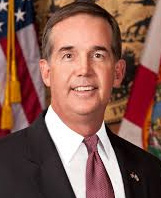Atmore Native Sworn In As Alabama’s Attorney General
February 14, 2017
An Atmore native was sworn in Monday as Alabama’s next attorney general.
 Governor Robert J. Bentley appointed Marshall County District Attorney, Steve Marshall, to serve as the 50th Attorney General of Alabama. Former Attorney General Luther Strange was appointed to the United States Senate following Senator Jeff Sessions’ appointment and confirmation as Attorney General of the United States.
Governor Robert J. Bentley appointed Marshall County District Attorney, Steve Marshall, to serve as the 50th Attorney General of Alabama. Former Attorney General Luther Strange was appointed to the United States Senate following Senator Jeff Sessions’ appointment and confirmation as Attorney General of the United States.
Following his appointment, Mr. Marshall said, “It is a great honor to be named Attorney General and I am thankful to Governor Bentley for the opportunity to serve the people of Alabama. The time spent working alongside law enforcement for the last 20 years has been a remarkable privilege. As Attorney General, I will continue to support their efforts to keep Alabamians safe and free from violent crime.”
Marshall was born October 26, 1964, in Atmore, Alabama, the only child of the late Conrad and Mary Jo Marshall. Conrad Marshall was a representative for a sporting goods manufacturer and Mary Jo Marshall was a secretary.
father’s job caused the family to move quite a bit during Steve’s childhood. When he was 3-years-old, Steve moved with his family to Mobile, where they stayed until the end of his first grade year. From there, they lived in Florida, Georgia, South Carolina and North Carolina. Despite leaving Alabama in first grade and living in several Southern states, Steve knew Alabama was his home and returned to attend the University of Alabama School of Law.
FWC Law Enforcement Report
February 14, 2017
The Florida FWC Division of Law Enforcement reported the following activity during the weekly period ending February 9 in Escambia and Santa Rosa counties.
ESCAMBIA COUNTY
Officer Allgood checked a fisherman as he returned to Sherman’s Cove and discovered the man was in possession of red snapper fillets. Red snapper season is currently closed and it is a violation to clean the fish before it is landed. The individual was issued a notice to appear citation for the violations.
 Lieutenant Allen and Officer Guy received a call from a local landowner stating that he had witnessed two suspects illegally hunting on his property. While the officers were en route, the landowner called back stating the suspects had gone and he provided their vehicle description. The officers canvased the area and located the vehicle pulling into a residence. One of the suspects was in the vehicle and initially denied that he had been hunting that morning. After further questioning, the suspect admitted to hunting and dropping the second suspect off at his residence. Officers Burkhead and Little responded to assist with the investigation and went to the second suspect’s residence, where they saw a whitetail doe carcass in the yard. A records check showed that this suspect was a convicted felon. This suspect admitted to being on the landowner’s property but denied having a gun. Upon further investigation and interviews, the suspect admitted that he did have a gun and also admitted to hiding three guns in a wooded area behind his residence prior to the officers arriving. Armed trespass charges were direct filed against both suspects. One of the suspects was also charged with possession of a firearm by a convicted felon and possession of an antlerless deer during the closed season.
Lieutenant Allen and Officer Guy received a call from a local landowner stating that he had witnessed two suspects illegally hunting on his property. While the officers were en route, the landowner called back stating the suspects had gone and he provided their vehicle description. The officers canvased the area and located the vehicle pulling into a residence. One of the suspects was in the vehicle and initially denied that he had been hunting that morning. After further questioning, the suspect admitted to hunting and dropping the second suspect off at his residence. Officers Burkhead and Little responded to assist with the investigation and went to the second suspect’s residence, where they saw a whitetail doe carcass in the yard. A records check showed that this suspect was a convicted felon. This suspect admitted to being on the landowner’s property but denied having a gun. Upon further investigation and interviews, the suspect admitted that he did have a gun and also admitted to hiding three guns in a wooded area behind his residence prior to the officers arriving. Armed trespass charges were direct filed against both suspects. One of the suspects was also charged with possession of a firearm by a convicted felon and possession of an antlerless deer during the closed season.
SANTA ROSA COUNTY
Officer Hutchinson received information about a hunter who used a high-powered rifle to shoot a deer while hunting the Escambia River WMA during muzzle loading season. While driving towards the boat ramp where the subject’s vehicle was parked, he saw the subject’s vehicle travelling towards him. As the vehicle passed by, he observed a whitetail deer lying in the boat that was being towed by the subject’s vehicle. During a subsequent traffic stop, the subject claimed he shot the deer with a muzzle loader rifle. Officer Hutchinson discovered that he was in possession of only a muzzle loader, but after further questioning and inspection of the deer, the subject admitted to shooting the deer with a high-powered rifle. The subject called a friend to bring him a muzzle loader after he shot the deer. Once the friend arrived at his location, they swapped guns and the subject took possession of the muzzle loader and gave his friend the high-powered rifle to take back with him. Officer Hutchinson issued the subject a notice to appear citation for the violation of illegal method of taking game. The firearm and the deer were seized as evidence.
Officers Hutchinson and Arnette were informed by Lieutenant Golloher and Officer Tolbert about a vehicle that was travelling along several back roads while shining a spotlight into the fields and into tree lines. The officers drove to the area where the subject was seen and Officer Hutchinson saw the vehicle parked at a field while shining a spotlight into the field in a manner capable of disclosing the presence of deer. He conducted a traffic stop on the vehicle and discovered a loaded a 12‑gauge shotgun in the front seat. While conducting a search of the vehicle, he also discovered an open container of alcoholic beverage in the front console. The subject was issued a notice to appear citation for possession of a firearm while shining a light in a manner capable of disclosing the presence of deer. He was also issued a citation for possession of an open container of alcohol in the vehicle. The firearm was seized as evidence.
While working a night-hunting detail, officers observed a truck driving in a suspicious manner. The driver was shining a light in specific areas where deer are often seen. Officer Hutchinson approached the truck and watched him shining a light into a field. He stopped the vehicle and discovered a loaded, 12‑gauge shotgun in the front seat as well as an open beer in the front console. The man was issued a notice to appear for night hunting and a traffic citation for possession of an open container of alcohol in the vehicle.
FWC officers teamed up with staff from the Division of Hunting and Game Management to assist with the Blackwater Hutton Unit Mobility Impaired Hunts. Working with several volunteers including family and friends of FWC staff, as well as retired officers, they provided lunch each day for the hunters and their guests. Several local businesses donated everything from food and drinks to hunting equipment for prizes to be given away. The hunters had an enjoyable time in the field and were very appreciative of the time and effort put into the events.
This report represents some events the FWC handled over the past week; however, it does not include all actions taken by the Division of Law Enforcement. Information provided by FWC.
NorthEscambia.com photo.
New Three Story, 50 Unit Apartment Complex Under Construction In Century
February 13, 2017
Land clearing is underway for a new 50-unit apartment complex is planned for Century.
“Century Park Apartments” is being constructed on Second Street, which is the entrance to the parking lot of of the Billy G. Ward Courthouse.
Plans call for two, three-story buildings and 125 parking spaces. Sixteen of the apartments will be 984 square feet with two bedrooms and one bath, while 22 will be 1,119 square feet with three bedrooms and two baths. There will also be 12 apartments with 1,291 square feet with four bedrooms and two baths.
Some of the apartments will be reserved for low income residents
NorthEscambia.com graphics and photos, click to enlarge.
Tate Takes Top High School Honors In CyberThon 2017
February 13, 2017
More than 140 local students from dozens of schools across Northwest Florida participated in CyberThon 2017 recently, with Tate High School taking home the top honors in the high school division.
 New for CyberThon 2017 was a “capture the flag” style gameplay carried out on the FacebookCTF platform customized specifically for this event. Teams worked to win points on the game board while completing challenges on a computer network that included a simulated online financial system. Dubbed “First Federation Credit Union,” the fully functional banking environment was designed by Premier Sponsor Navy Federal Credit Union. Teams used software tools including Security Onion and Splunk to monitor suspicious network activity and complete gameplay challenges.
New for CyberThon 2017 was a “capture the flag” style gameplay carried out on the FacebookCTF platform customized specifically for this event. Teams worked to win points on the game board while completing challenges on a computer network that included a simulated online financial system. Dubbed “First Federation Credit Union,” the fully functional banking environment was designed by Premier Sponsor Navy Federal Credit Union. Teams used software tools including Security Onion and Splunk to monitor suspicious network activity and complete gameplay challenges.
Control of the CyberThon leaderboard changed hands multiple times during the two-day competition, with teams from Pensacola State College, Pine Forest High School, Tate High School, and UWF all taking turns in the top spot. In the end, however, teams from UWF and Tate High School emerged as winners in the college and high school divisions.
A Tate High School team led by Kevin Schmidt took the top spot among high schools while scoring more points overall before penalties than any team in the event. Tate High swept both top spots among high schools, with a team led by Michelle Ward claiming second place.
In support of the Department of Homeland Security’s mission statement that “Homeland Security Begins with Hometown Security,” the three-day event also included keynote addresses on cybersecurity trends from leading experts in the cyber industry.
Photos for NorthEscambia.com, click to enlarge.
Motorcyclist Critical After Escambia Crash
February 13, 2017
An Escambia County man critically injured in a motorcycle crash Sunday evening.
According to the Florida Highway Patrol, 46-year old Dallas Rawlings was traveling east on Sorrento and ran off the roadway while attempting to pass several other vehicles. Rawlings was ejected from the motorcyle. He was airlifted to Baptist Hospital in critical condition.
Molino’s Troop 430 Celebrates Scout Sunday
February 13, 2017
Sunday was “Scout Sunday” at Aldersgate United Methodist Church in Molino. During the morning worship service, the scouts and leaders of Troop 430 Molino were honored with God and Family Awards and a slideshow of activities was presented. Scouts also received thee 2017 Scout Sunday Patch.
Troop 430 meets each week at Aldersgate UMC.
Courtesy photo for NorthEscambia.com, click to enlarge.
Atwater Stepping Down From Cabinet Post
February 13, 2017
State Chief Financial Officer Jeff Atwater announced that he will leave his elected position for a job at Florida Atlantic University after the upcoming legislative session.
Gov. Rick Scott will name a replacement for Atwater, who has held the Cabinet post since getting elected in 2010. The CFO position will be on the ballot again in 2018.
 Atwater, a former Senate president whose political future has long been the subject of speculation, unsuccessfully sought to become Florida Atlantic president three years ago. He will serve as a vice president at the Boca Raton school managing finances and economic development.
Atwater, a former Senate president whose political future has long been the subject of speculation, unsuccessfully sought to become Florida Atlantic president three years ago. He will serve as a vice president at the Boca Raton school managing finances and economic development.
“While I would have preferred to embrace this opportunity at a later date, the timing of crucial university initiatives warranted an accelerated transition,” the North Palm Beach Republican said in a statement.
“As a parent of FAU graduates, I cannot think of a better place to begin the next phase of my career,” Atwater added in a release from the university.
Atwater, who had considered a U.S. Senate run in 2016, is in his second term as CFO and would be prevented from seeking reelection next year due to term limits.
Atwater’s statewide post pays $128,972 a year. At FAU, he will replace Dorothy Russell, who retired in January after a decade at the university and was paid nearly $250,000 last year.
The 60-day legislative session begins March 7. Atwater, 58, noted in the statement that leaving after the session will give Scott “sufficient time” to name a replacement to serve out the remainder of Atwater’s term.
Scott, in a statement praising Atwater, said he would begin the process of making an appointment.
“I got to know CFO Jeff Atwater well in 2010 on the campaign trail, and like me, he has been laser-focused on keeping the cost of living low for all Floridians,” Scott said in his statement. “I am proud that the state has paid down over $7.6 billion in debt since 2011 and CFO Atwater has aggressively helped us achieve that goal. He has fought to reduce burdensome regulations that hinder job growth, protect families from financial fraud and has traveled the state to return more than $1 billion in unclaimed property to its rightful owners.”
Atwater, a banker who started his political career on the North Palm Beach Village Council in 1993, was elected to the state House in 2000 and moved to the Senate in 2002. He served as Senate president for the 2009 and 2010 sessions.
Current Senate President Joe Negron, R-Stuart, issued a statement calling Atwater “one of the leading fixtures in Florida government for the last 15 years.”
“When I was elected to the Senate in 2009, we were in the middle of the recession and working to balance a budget, while dealing with a multibillion-dollar shortfall,” Negron said. “I will always remember CFO Atwater’s strong and determined leadership during this extremely trying time. I know he will serve FAU with the same tenacity.”
As chief financial officer, Atwater teamed with Scott in 2012 to push legislation intended to reform the personal-injury protection portion of auto insurance coverage. However, the two also clashed in 2015 over the abrupt departure of Florida Department of Law Enforcement Commissioner Gerald Bailey, whose exit was orchestrated by the governor’s office.
Atwater was elected chief financial officer with 57 percent of the vote in 2010, and he got 59 percent when he was re-elected four years later.
Scott’s decision about appointing a replacement for Atwater could play a critical role in the 2018 contest for the Cabinet seat. The appointee could have a leg up in running for a full term in the job.
Nobody has opened a campaign account to run for the office in 2018, according to the state Division of Elections website. However, the names of a number of potential appointees have already been floated.
Those names include Lt. Gov. Carlos Lopez-Cantera, who Scott appointed to his current post after Jennifer Carroll was asked to leave the administration in 2013. Other names include former state Rep. Tom Grady and state Sens. Jeff Brandes of St. Petersburg, Tom Lee of Thonotosassa, Lizbeth Benacquisto of Fort Myers and Jack Latvala of Clearwater.
Latvala has been an ally of Scott on economic incentives and recently floated a potential candidacy for governor in 2018.
Grady, a Naples neighbor of Scott, is currently vying to become president of Florida Gulf Coast University. He has been appointed in the past by the governor to the State Board of Education and to lead the Office of Financial Regulation.
At FAU, Atwater will report to President John Kelly, who landed the job Atwater briefly pursued in January 2014.
“When I approached Jeff about joining us here, it was immediately obvious he cares passionately about FAU,” Kelly said in a prepared statement. “There is no better person to help guide this university’s finances and corporate relationships as we continue with unbridled ambition to make FAU America’s fastest improving university.”
by Jim Turner, The News Service of Florida
Save Your Sweetheart First Aid Class Tuesday At Molino Library
February 13, 2017
Escambia County residents can learn basic first aid skills Tuesday, february 14 at 6 p.m. at the Molino Branch Library.
 Escambia County Fire Rescue staff will provide basic first aid techniques and tips to keep residents and their Valentine’s Day sweethearts safe and healthy. An additional first aid class for teens 13-17 will be offered Tuesday, February 21 at 6 p.m.
Escambia County Fire Rescue staff will provide basic first aid techniques and tips to keep residents and their Valentine’s Day sweethearts safe and healthy. An additional first aid class for teens 13-17 will be offered Tuesday, February 21 at 6 p.m.
These classes are not for certification.
For information on these and other library events, call (850) 436-5060.
The Molino Branch Library is located at , 6450-A Highway 95A North in the Molino Community Complex.
20 Years Overdue For Inspection: Are The Bridges In Century Safe?
February 12, 2017
NorthEscambia.com has learned that town-maintained bridges in Century have not been inspected in years… at least one since 1995…about 22 years ago.
State law mandates that most bridges be inspected at least every two years.
Bridges are then classified as being safe, or as “functionally obsolete” or “structurally deficient”.
“Functionally obsolete” means that the bridge design is outdated. For example, narrow shoulders, narrow lanes, or older traffic barriers can induce the functionally obsolete classification. Functionally obsolete bridges are scheduled for replacement or rehabilitation as budgets permit.
“Structurally deficient” bridges are recommended for repair, or scheduled for replacement; meanwhile, they are posted as necessary for load, or closed.
Century Mayor Henry Hawkins says the town is working to hire a bridge inspection company or seven town-maintained bridges.
Pictured: A culvert aNorthEscambia.com photo, click to enlarge.
Bright Futures, Block Tuition Changes Backed
February 12, 2017
With debates over block tuition at state universities and graduating state college students more quickly, a Senate panel backed a bill that would expand Bright Futures scholarships, impose stricter graduation standards and increase financial aid for first-generation students.
The bill (SB 2) is part of Senate President Joe Negron’s higher-education initiative. It cleared the Senate Higher Education Appropriations Subcommittee in a 5-1 vote, with opposition from Sen. Jeff Clemens, D-Lake Worth.
Clemens unsuccessfully tried to amend the bill, including with a proposal to let the 12 state universities review the financial impact of block tuition before mandating its use in the fall of 2018.
 A move to block tuition would require undergraduates to pay a flat tuition rate per semester, rather than be billed on the current credit-hour basis. The bill would require block tuition but leave it up to the universities to develop the specific plans.
A move to block tuition would require undergraduates to pay a flat tuition rate per semester, rather than be billed on the current credit-hour basis. The bill would require block tuition but leave it up to the universities to develop the specific plans.
Clemens said he was concerned that if the proposal results in universities only charging for what now represents 12 credit hours per semester but students take 15 or more credit hours, it would lead to a substantial revenue loss for the schools. He said he has been told it could be $30 million or more for some universities.
“That’s a big concern. That’s not a small hit,” Clemens said. “There is a real impact to the revenue loss here that we are not taking into account.”
His amendment was defeated in a voice vote after drawing opposition from Sen. Bill Galvano, a Bradenton Republican who chairs the subcommittee and is sponsoring the bill.
Galvano said the Senate was waiting to see block tuition plans from the universities, which have had the block-tuition option for a number of years but have failed to advance a plan. He also said if a plan reduced tuition, which would be a savings for students, the financial loss for the schools could be offset by other funding.
“I think we all can anticipate a very robust education budget at the university level,” Galvano said. “Let’s see what the (university block tuition) plans are. Let’s see how it works.”
Other provisions in the bill would hold universities to a new performance standard based on a four-year graduation rate, rather than the six-year measure now used.
At the 28 state colleges, the performance standards would be measured on a two-year basis for students seeking associate degrees and a four-year standard for students seeking baccalaureate degrees.
College presidents and students have raised objections to that provision, arguing that many of the system’s 800,000 students are “non-traditional,” with 65 percent of fall 2015 enrollment being part-time students and 58 percent minority students.
Nadia Esha, student government president at Florida State College at Jacksonville, said students on her campus are “strongly opposed” to the legislation.
She said the 60 percent of the school’s students who are part time “cannot attend or complete their (baccalaureate) degree in four years.”
“These are hard-working, non-traditional students that seek flexibility that only colleges like FSCJ can provide,” Esha said.
Sen. Gary Farmer, D-Fort Lauderdale, offered an amendment to ease that college standard, seeking to allow students to earn associate degrees within three years and baccalaureate degrees within five. But it was defeated.
Galvano, who was once a part-time state college student in Manatee County, said the performance standard would be aimed at “full-time” students, rather than the part-time college students.
Another provision in the bill would expand Bright Futures merit scholarships for the top students, known as “academic scholars,” to cover 100 percent of tuition and fees, while also providing $300 a semester for books. The top Bright Futures scholarship now only covers about half the tuition and fees at state universities.
Joe Glover, a provost at the University of Florida, said UF supports the bill, including the Bright Futures expansion as well as a commitment to double the state funding match for a program that supports “first generation” students attending state universities or colleges.
Glover said UF had 1,159 first-generation students enrolled this academic year.
But the problem has been there are more students eligible for the need-based financial aid than available funding. In the 2015-2016 academic year, the first-generation aid program supported 8,200 students. Another 13,700 were eligible but received no funding according to the state Department of Education.
The Higher Education Appropriations Subcommittee on also passed a bill (SB 4) that would create funding pools to help universities attract top-quality faculty and recognize high-achieving graduate and professional programs, including law and medical schools.
by Lloyd Dunkelberger, The News Service of Florida












